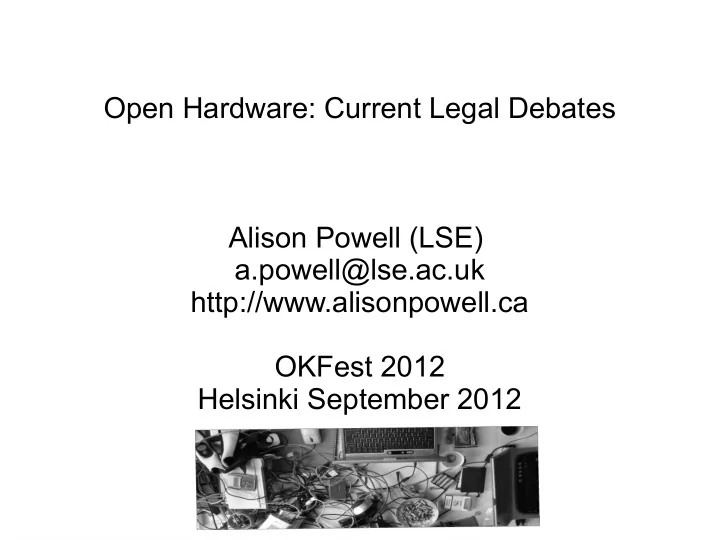

Open Hardware: Current Legal Debates Alison Powell (LSE) a.powell@lse.ac.uk http://www.alisonpowell.ca OKFest 2012 Helsinki September 2012
Kinds of open hardware Electronics, Manufacturing, DIY, Crafts, OH4D
“Open Source” meets the physical world
Hardware hacking: does intellectual property matter?
Open Hardware for Development: maintaing a knowledge commons
The long tail: licensing for iteration, sustainability and profit
Open Hardware Licenses, Standards, Governance
Open Source Hardware Definition 1. Documentation (The hardware must be released with documentation including design files, and must allow modification and distribution of the design files) 2. Scope (must specify the portion of the design) 3. Necessary Software (must be feasible to write open source software) 4. Derived Works (allows modifications and derived works, and shall allow them to be distributed under the same terms as the license of the original work.) 5. Free redistribution (no requirements for royalties of sale or free distribution of documentation) 6. Attribution (designers may be identified) 7. No Discrimination Against Persons or Groups 8. No Discrimination Against Fields of Endeavor 9. Distribution of License (rights apply to all) 10. License Must Not Be Specific to a Product 11. License Must Not Restrict Other Hardware or Software 12. License Must Be Technology-Neutral (excerpted from: http://freedomdefined.org/OSHW)
Some Types of Open Hardware Licenses/Standards/etc Fully copyleft (OHANDA) 'turtles all the way down' – a boundary problem Copyleft on documentation (CERN, TAPR) Is this too easy to circumvent? Non-OSHW conforming (Chumby HDK, Balloon License, etc) Middle ground that attempts to prevent manufacturers from 'harrassment'. More necessary in US than in UK due to patent law? Non-copyleft (Apache derived) Problem of free riders?
Recent debates Introducing a Unique Design Identifier (UDI) in v 1.2 of CERN OHL – This creates a requirement to link the object to the design specifications, found somewhere publicly accessible – no specification of where this should be: anywhere on the web – Javier from CERN notes that there are 2 types of OHL developers: • 1. folks that 'play along' and publish designs in good faith • Folks that follow the letter of the license, but not the spirit
What is a licence? PERMISSION to do something which would otherwise be ILLEGAL
Hardware Copyleft? Another problem with copyleft licences: THERE CAN BE ONLY ONE* *(ish)
Now where? Where should OHANDA and other projects go? • Success in introducing ideas such as UDI •Appeals primarily to 'makers' from OSS software culture •How can the expansion of open making/DIY be addressed by new legal campaigns?
Recommend
More recommend